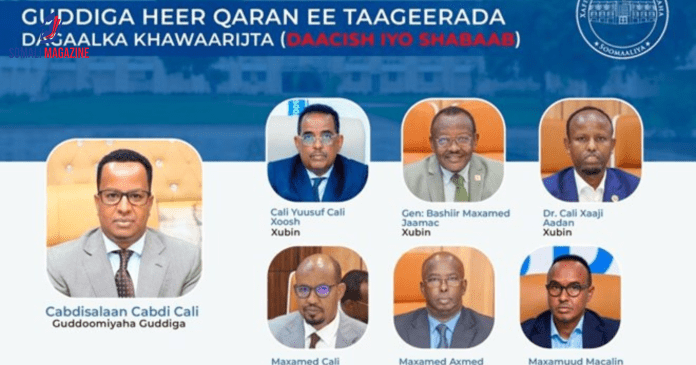Facebook Twitter (X) Instagram Somali Magazine - People's Magazine
A newly established multi-sectoral committee will oversee military operations, financial disruption, counter-extremism efforts, and security sector reforms in Somalia’s ongoing battle against terrorism
Somali Prime Minister Hamsa Abdi Barre has established a new high-level National Committee to oversee the country’s efforts in fighting against extremist groups such as Al-Shabaab and ISIS-Somalia. The committee is tasked with organizing and coordinating the country’s efforts to weaken these groups on multiple fronts.
The committee is led by Second Deputy Prime Minister Abdisalan Abdi Ali, and it includes senior government officials and security experts. Some of the members of this committee are:
-
Ali Yusuf Hosh, the Minister of Interior
-
Gen. Bashir Mohamed Jama, the Minister of Environment
-
Dr. Ali Hajji Adan, the Minister of Health
-
Mohamed Ali Hagaa, the State Minister for Internal Security
-
Mohamed Ahmed Amir, the Mayor of Mogadishu
-
Mohamud Moalim Hassan, the Commissioner of the Disaster Management Agency
This committee takes a broad approach to tackling the extremist insurgency. It will work on both military and ideological fronts to fight Al-Shabaab and ISIS-Somalia. Its main objectives include:
-
Enhancing Military Operations: The committee will support the Somali National Army (SNA) and regional forces in ongoing offensives to weaken terrorist networks.
-
Disrupting Terrorist Financing: The committee will also work on cutting off financial resources that these extremist groups use to fund their operations.
-
Counter-Extremism and Community Resilience: The committee plans to run campaigns that promote deradicalization and build resilience in communities, making it harder for these groups to recruit.
-
Reforming the Security Sector: Strengthening collaboration among intelligence agencies, law enforcement, and the military will be another priority.
The committee is set to meet soon to discuss its action plan. They will focus on creating a roadmap for operations, mobilizing resources, and improving cooperation between different government agencies. The committee also aims to engage with local communities to ensure they are part of the national effort against terrorism.
This move comes at a critical time for Somalia, as the country is in the middle of an intense campaign against terrorist groups. In the past year, Somali government forces, supported by local militias and international partners, have managed to regain control of important areas in regions like Hirshabelle, Galmudug, and Lower Shabelle.
However, despite these successes, Al-Shabaab remains a major threat. The group, which is linked to Al-Qaeda, continues to carry out attacks using guerrilla tactics and targeted assassinations, particularly in urban areas. Al-Shabaab’s ability to carry out these attacks has made it difficult to fully secure many parts of Somalia.
On the other hand, ISIS-Somalia is a smaller group that operates mainly in the northern part of the country, particularly in Puntland. While they are not as widespread or powerful as Al-Shabaab, ISIS-Somalia continues to pose a significant security challenge in the region.
Overall, this new committee represents Somalia’s strengthened approach to fighting terrorism by using a combination of military action, financial disruption, counter-extremism campaigns, and reforms in the security sector. The government hopes that this multi-faceted approach will help turn the tide in the ongoing battle against Al-Shabaab and ISIS-Somalia.

